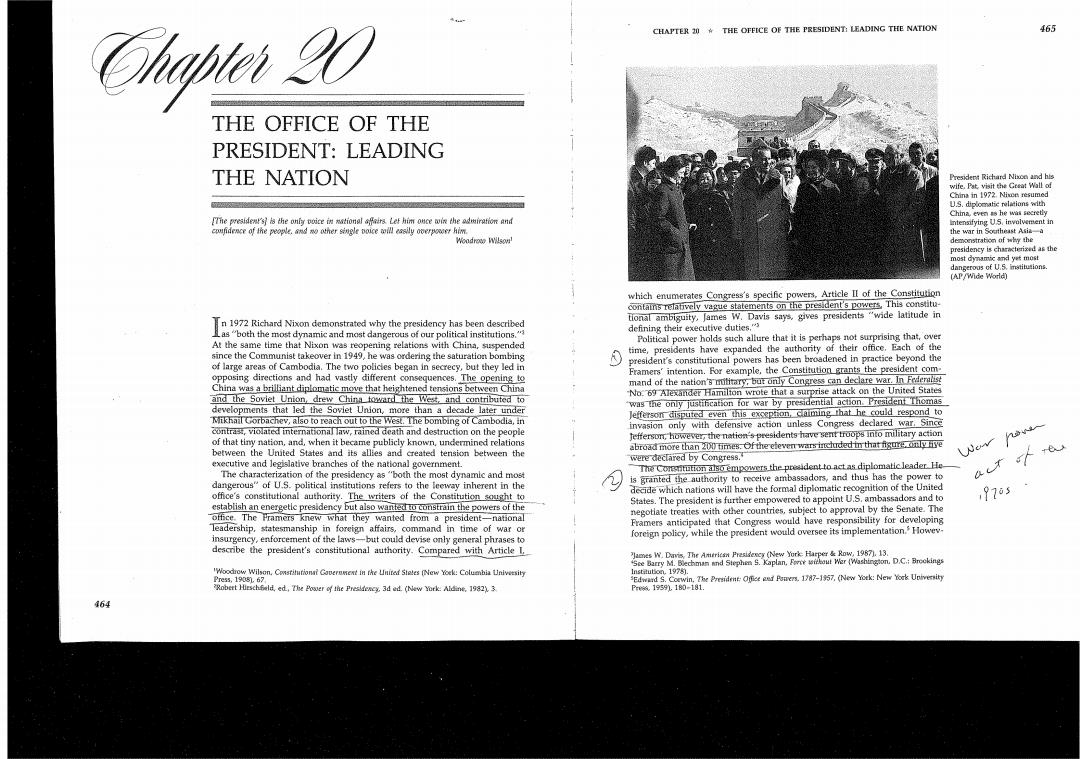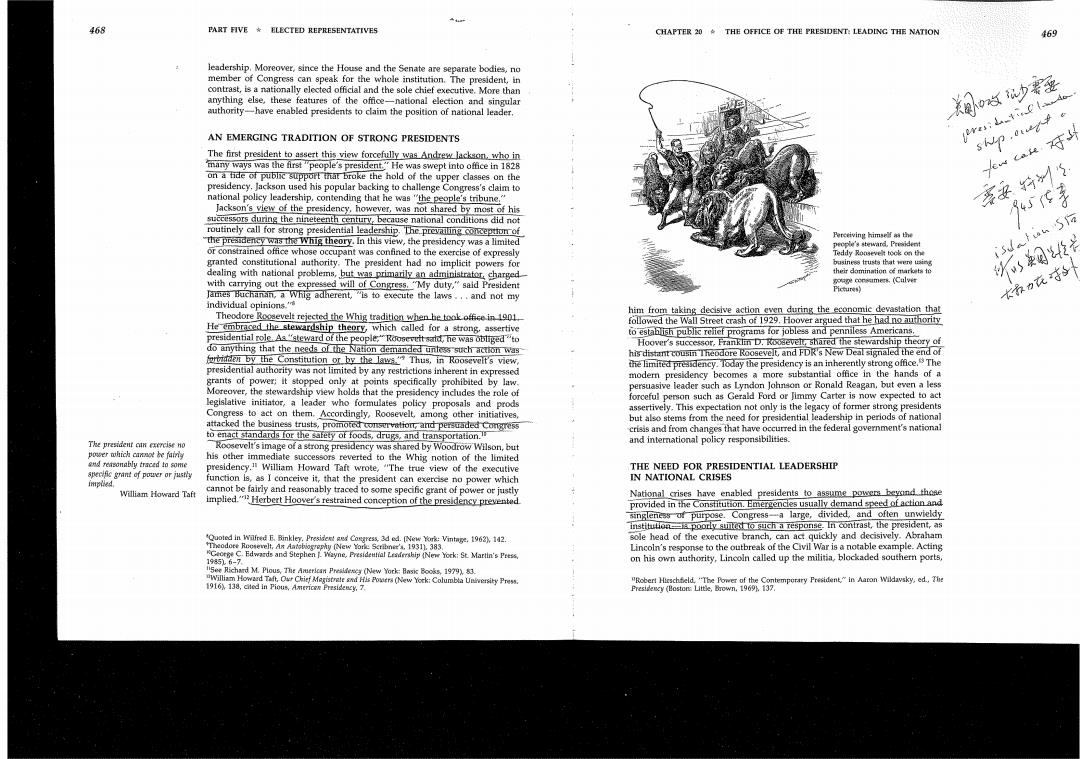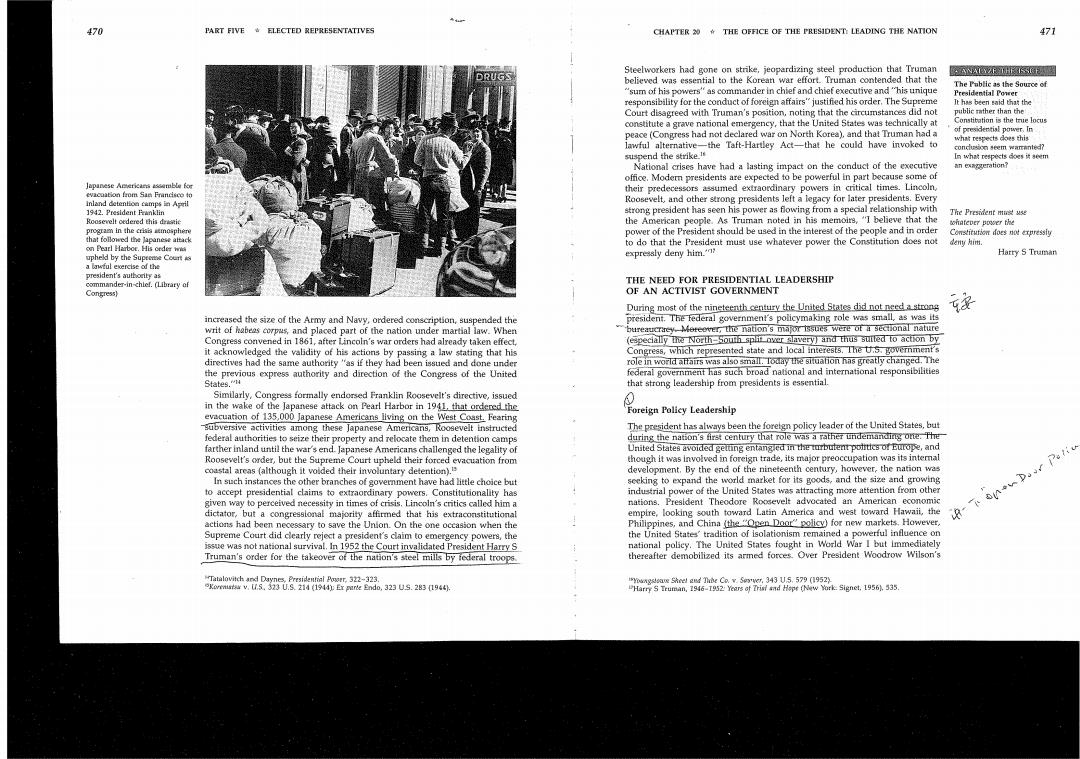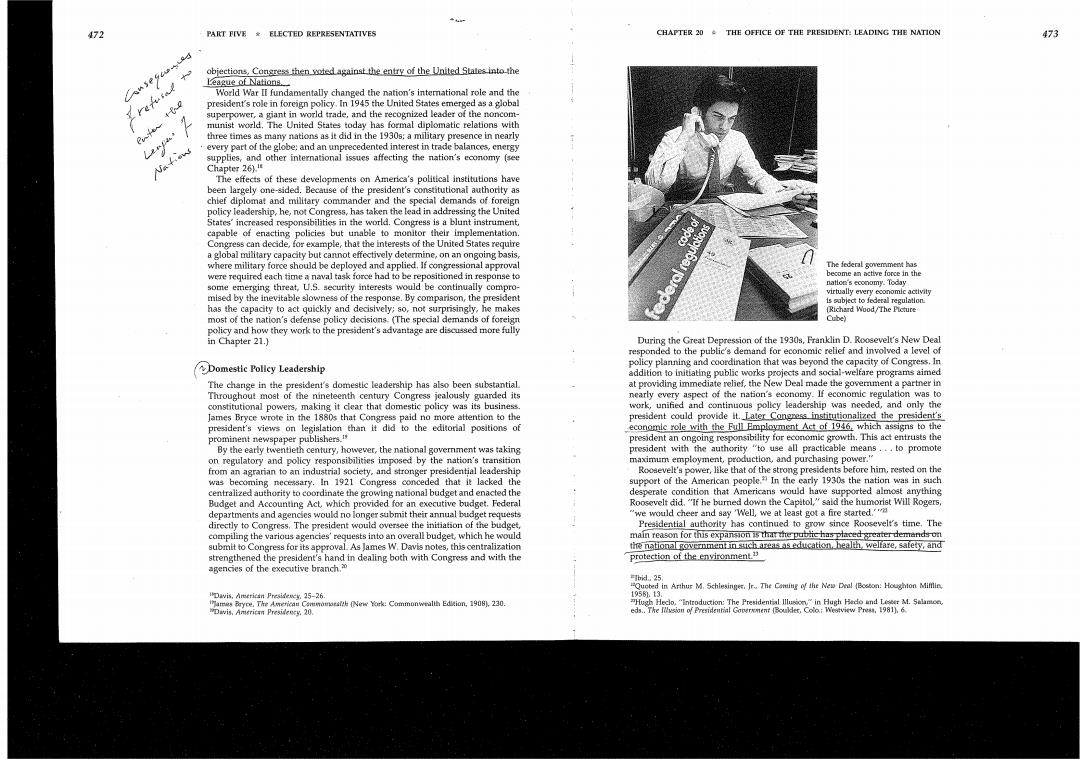
Crg 90 CHAPTER 20 THE OFFICE OF THE PRESIDENT:LEADING THE NATION 465 THE OFFICE OF THE PRESIDENT:LEADING THE NATION President Richard Nixon and his wife,Pat visit the Great Wall of China in 1972.Niwe resumed U.S.diplomatic relations with The preside's the oniy poice in mtional afirs Lef him once win the admiration and nte Wondro Wisou dangerous of U.5.mstitutions. AP/MoWi词 which enumerates Congress's specific powers,Article II of the Constitution tans relafvely vague statements on the president's powers This constu n 1972 Richard Nixon demonstrated why the presidency has been described tional ambiguity,James W.Davis says gives presidents "wide latitude in as"both the most dynamic and most dangerous of our political institutions." defining their executive duties." At the same time that Nixon was reopening relations with China,suspended Political power holds such allure that it is perhaps not surprising that,over since the Communist takeover in 1949,he was ordering the saturation bombing time,presidents have expanded the authority of their office.Each of the of large areas of Cambodia.The two policies began in secrecy,but they led in president's constitutional powers has been broadened in practice beyond the opposing directions and had vastly different The opening to Framers'intention.For example,the Constitution grants the president com mand of the nation's mititary,but unly Congress can declare war.In Federlist China was a brilliant diplomatic move that heightened tensions between China and the Soviet Union,drew China toward the West,and contributed to No.69 Alexander Hamilion wrote that a surprise attack on the United States developments that led the Soviet Union,more than a decade later under was the only justincation for war by presidential action.Presidenf Thomas lefferson disputed even this exception,claiming that he could respond to Mikhail Gorbachev,also to reach out to the West.The bombing ot Cambodia,in contrast,violated international law,rained death and destruction on the people invasion only with defensive action unless Congress declared war.Since of that tiny nation,and,when it became publicly known,undermined relations Jefferson,however,the nation's presidents have sent truops into military action abroad more than 200 fimes.Of the eteven wars inctuded in that figure.nly lye between the United States and its allies and created tension between the were declared by Congress. executive and legislative branches of the national government. The characterization of the presidency as "both the most dynamlc and most tution the preaident to act as diplomatic leader He dangerous"of U.S.political institutions refers to the leeway inherent in the is granted the authority to receive ambassadors,and thus has the power to decide which nations will have the formal diplomatic recognition of the United office's constitutional authority.The writers of the Constitution sought to States.The president is further empowered to appoint U.S.ambassadors and to ,97o5 establish an energetlc presidency but also wanted to cunstrain the powers of the negotiate treaties with other countries,subject to approval by the Senate.The office.The Framers knew what they wanted from a president-national leadership,statesmanship in foreign affairs,command in time of war or Framers anticipated that Congress would have responsibility for developing insurgency,enforcement af the Laws-but could devise only general phrases to foreign policy,while the president would oversee its implementationHowev describe the president's constitutional authority.Compared with Article L ddTheorrdd (New yurk PM19591180-181. 464

466 PART FIVE ELECTED REPRESENTATIVES CHAPTER 20 THE OFFICE OF THE PRESIDENT:LEADING THE NATION 467 er,the president has become the principal architect of U.S.foreign policy and has even acquired the power to make treaty-like arrangements with other nations,in the form of executive agreements.In 1937 the Supreme Court ruled THE PRESIDENT'S CONSTITUTIONAL AUTHORITY that such agreements,signed and approved only by the president,have the same legal status as treaties,which requlre approval by a two-thirds vote of the Senate*Since World War I[,presidents have negotiated more than 9,000 Commander in chie Article I[section 2:"The President the Senate,by granting commissions which shall expire at executive agreements,as compared with roughly 500 treats ranti by the shall be commander in chief of the Army and Navy of the the end of their ned session." Senate. United States,and of the militia of the several states.' Article IL section 3:"He shall take care that the laws be The Constitution also vests"executive power"in the president,granting him faithfully executed,and shall commission all the officers Chief.Article ll,section 2:"He may require the the power to execute the laws and to appoint major of the United States such as opinion,in writing of the peincipal officer in each of the heads of the various departments ofthe executive branch.In Fedemlis!No.76 executive departments,upan ary subject relating to the Chief diplomit.Article Il section 2:"He shall have power Hamilton indicated that the president's real authority as chief executive was to duties of their respective offices,and he shall have power and with the advice and consent of the Senate,to make be found in this appointive capacity.Presidents have indeed exercised substan- rat reprieves and pardons forfeneanthe treaties,provided two thirds of the senators present tial power through their appointments,but they have found their administrative United States,except in cases of impeachment' concur." authority-the power to execute the laws-to be of even greater value,because Artice 1,section 2:"He shall hav power,by and with Article 11,section 3:"He shall receive ambassadors and it enables them to determine how laws will be interpreted and applied. the advice and consent of the Senate,to make treatles other public ministers." ⑨ Finally,the Constitution provides the president with legislative authority. moeanhrtmnoi2gaetoao5n0t话 ate,and by and with the advice and consent of .Article I,section 3:"He shall from including use of the veto and the to recommend-proposso Congress.The Framers expected this authority to be used in a limited and the Senate,shall appoint ambassadors,othe public min- time to time give to the Congress informalion of the state of the Unior nd recommend to their consideration such largely negative way.George Washington acted as the Framers anticipated:he isters and consuls,judges of the Supreme Court,and all measures as he shall judge necessary and expedient:he proposed only three legislative measures and vetoed only two acts of Congress. may,on extraordinary occasions,convene both houses,o Modern presidents have a different,more activist view of their legislative role. either of them.and in case of disagreement between them. established by law." They routinely submit legislative proposals to Congress and often veto legisla. Article II,section 2:"The President shall have power to with respect to the time of adjournment,he may adjoum fill upall vacancies that may happen daring the them to such time as he shall think proper. tion they find disagreeable.The champion of the veto is Eranklin D.Roosevelt. who during his twelve years in office rejected 635 acts of Congress. This chapter explains why the presidency has become a stronger office than the Founders envisioned.It argues that the president's prominenee-stems rimariy from hisunique relationship with the American people.The presie is the only truly nationally elected leader in the 0.S.political system,and the public looks first to him for national leadership.The responsibility thus Foundations of the Modern Presidency accorded presidents has enabled them,as the executive demands on govern- ment have increased during the past century,to assume broad powers that have The writers of the Constitution chose to vest executive authority in a single helped to transform the office.[ronically,as the president's responsibilities have individual in order to create an energetic presidency.The Framers debated the grown,so have his difficultiesn his office.The moder president possibility of a threeperson executive (one presidenteacfro the northem. necessarity depends on a great many assistants to help him carry out his duties, midd e,and southern states)hut rafueted te ilea on the grounds that a joint but,as the chapter's concluding section explains,the staff's large size frustrates office would be rendered useless hy constant dissension and intrigue.They also the president's attempts to control everything that is done in his name.The believed that only a single executive could provide decisive action in case of a main ideas of the chapter are these. military attack on the United States."Unity,"Alexander Hamilton wrote in Federalist No.70,"is conducive to energy"The Framers worried that a single executive might become too powerful but believed that adequate protection required the presidency to become9 strong office.nderlying this developme附场the pubiic against such a threat was provided by the separation of powers and the suppon that the president cquires from the circumstance that ke is the only mationelly fected president's selection by electors.Although the president would represent the people,he would not be chosen directly by them.This arrangement would The modem presidency couid operate wiholarge of assi eerand protect him against excessive public demands and af the same time deny him gh-levef managers,the sheer对his staff mai s it the president to the reserve of power that direct public election could confer. The Framers failed to anticipate that the president someday would in effect be chosen through popular election (see Chapter 19)The Framers also underest mated the stgnificance of the fact th the presidency is a national office. U.S v..57 U.S.758 (19371 Baymand Tatalevich and Byre W.Daynes,Presifextisl Poaer in uired States (Monterey,Callf Senators and representatives are chosen by voters within a single state or Brooks/Cole,1984)263. district,a limitation that diminishes the claim of any one of them to national

468 PART FIVE ELECTED REPRESENTATIVES CHAPTER 20 THE OFFICE OF THE PRESIDENT:LEADING THE NATION 469 leadership.Moreover,since the House and the Senate are separate bodies,no member of Congress can speak for the whole institution.The president,in contrast,is a nationally elected official and the sole chief executive.More than anything else,these features of the office-national election and singular authority-have enabled presidents to claim the position of national leader. 视点的强 2:毛¥C4 AN EMERGING TRADITION OF STRONG PRESIDENTS The first president to assert this view forcefully was Andrew lackson,who in many ways was the first"people's president."He was swept into office in 1828 on a tide of publc supporl broke the hold of the upper classes on the wafe presidency.Jackson used his popular backing to challenge Congress's claim to national policy leadership,contending that he was "the people's tribune." 雾安特州及 Jackson's view of the presidency.however,was not shared by most of his successors during the nineteenth century,because national conditions did not routinely call for strong presidential leadership.The prevailing ep of the presideney was the Whig theory.In this view,the presidency was a limited or constrained office whose occupant was confined to the exercise of expressly granted constitutional authority.The president had no implicit powers for dealing with national problems,but was primarily an administrator,charged their domination c markets to 共 with carrying out the expressed will of Congress."My duty,"said President gope comamers.(Culwer Pictures) Janes Buchanan,a Whig adherent,"is to execute the laws and not my 太抗力花诗的 ndividual opinions.' Theodore Rooevelt rejected the Whig tradition when be him from taking decisive action even during the economic devastation that followed the Wall Street crash of 1929.Hoover argued that he had no athority He embraced the stewardship theory,which called for a strong.assertive to establish public refief programs for jobless and penniless Americans. Hoover's successor,Franklin D.Rooevelt,shiared the stewardship theory of do anything that the needs of the Nation demanded untess such action was idby the Constitution or by, his distant cousin Theodore Roosevelt,and FDR's New Deal signaled the end of in Roosevelt's view. presidential authority was not limited by any restrictions inherent in expressed fhe limited presidency.Today the presidency is an inherently strong office.The modern presidency becomes a more substantial office in the hands of a grants of power;it stopped only at points specifically prohibited by law Moreover,the stewardship view holds that the presidency incudes the role of persuasive leader such as Lyndon Johnson or Ronald Reagan.but even a less legislative initiator,a leader who formulates policy proposals and prods forceful person such as Gerald Ford or Jimmy Carter is now expected to act Congress to act on them.Accordingly,Roosevelt,among other initiatives, assertively.This expectation not only is the legacy of former strong presidents attacked the business trusts,promote on and persuaded Con but also stems from the need for presidential leadership in periods of national to enact standards for the safety of foods,drugs,and transportation. crisis and from changes that have occurred in the federal government's national Tke president can exercise no Roosevelt's image of a strong presidency was shared by Woodrow Wilson,but and international policy responsibilities. his other immediate successors reverted to the Whig notion of the limited presidency.William Howard Taft wrote,"The true view of the executive THE NEED FOR PRESIDENTIAL LEADERSHIP specific grant o时power or justly impiled. function is,as I conceive it,that the president can exercise no power which IN NATIONAL CRISES William Howard Taft cannot be fairly and reasonably traced to some specific grant of power or justly implied Herbert Hoover's restrained coneption of the presidency preventd National crises have enabled presidents to assuame powers beyond those provided in the Constitution.Emergencies usually demand speed of actian and singleness of purpose.Congress-a large,divided,and often unwiekdy institution-poorly sute o such a response.In contrast,the president,as E.Binkley.Presidet Congress.3d ed.[New York:Vintage,1962)142. sole head of the executive branch,can act quickly and decisively.Abraham 31383 Lincoln's response to the outbreak of the Civil War is a notable example.Acting 198516- .Edwards and Stephen Wayne,Presideutial (Ne Yock:St Martin's Press on his own authority,Lincoln called up the militia,blockaded southern ports, See Richard M.Plous,The (New York:Bask Books,1979)83. William Howard Taft,Our Chief Meg 1916)138,cited in Pious,Americex Presidency.7. Colum mtemporary President"in Aaron Wildavsky,ed..The

470 PART FIVE ELECTED REPRESENTATIVES CHAPTER 20*THE OFFICE OF THE PRESIDENT LEADING THE NATION 471 Steelworkers had gone on strike,jeopardizing steel production that Truman DRUGS ANAL图 believed was essential to the Korean war effort.Truman contended that the The Public as the Source of "sum of his powers"as commander in chief and chief executive and "his unique responsibility for the conduct of foreign affairs"justified his order.The Supreme been taid时h Court disagreed with Truman's position,noting that the circumstances did not the红than the constitute a grave national emergency,that the United States was technically at onshbation ts the tuie locus peace(Congress had not deelared war on North Korea).and that Truman had a what respects does this lawful alternative-the Taft-Hartley Act-that he could have invoked to condusion seem waranted? suspend the strike In what respects does geem National crises have had a lasting impact on the conduct of the executive office.Modern presidents are expected to be powerful in part because some of Japanese Americans assumble for their predecessors assumed extraordinary powers in critical times.Lincoln. evacuation from San Francisco to Inland detention camps in April Roosevelt,and other strong presidents left a legacy for later presidents.Every 1942.President Franklin strong president has seen his power as flowing from a special relationship with The President mus装 Roosevelt oedered this drastie the American people.As Truman noted in his memoirs,"I believe that the the power of the President should be used in the interest of the people and in order to do that the President must use whatever power the Constitution does not deyi出. uphel by the expressly deny him. Harry S Truman ful exercise of the president's authority as commander-in-chlef.(Library of THE NEED FOR PRESIDENTIAL LEADERSHIP Congress) OF AN ACTIVIST GOVERNMENT During most of the nineteenth century the United States did not need a strong increased the size of the Army and Navy,ordered conscription,suspended the president.The federal government's policymaking role was small,as was its writ of habeas corpus,and placed part of the nation under martial law.When bureaucrrey.Mereever,the nation's major issues were of a sectional nature Congress convened in 1861,after Lincoln's war orders had already taken effect (especially the North-South split over slavery)and thus suiled to action by it acknowledged the validity of his actions by passing a law stating that his Congress,which represented state and local interests.Thegovermens directives had the same authority "as if they had been issued and done under role in world affairs was also small.Today the situation has greatly changed.The pauthority and irction of the Comgreas of the United federal government has such broad national and international responsibilities that strong leadership from presidents is essential. Similarly,Congress formally endorsed Franklin Roosevelt's directive,issued 0 in the wake of the Japanese attack on Pearl Harbor in 1941,that ordered the Foreign Policy Leadershlp evacuation of 135,000 Japanese Americans living on the West Coast.Fearing Subversive activities among these Japanese Americans,Roosevelt instructed The president has always been the foreign policy leader of the United States,but federal authorities to seize their property and relocate them in detention camps during the nation's first century that role was a rather undemanding one.The farther inland until the war's end.Japanese Americans challenged the legality of United States avoided getting entangled in the turbutent polrttes of Europe,and Roosevelt's order,but the Supreme Court upheld their forced evacuation from though it was involved in foreign trade,its major preoccupation was its intemal coastal areas (although it voided their involuntary detention). development.By the end of the nineteenth century,however,the nation was In such instances the other branches of government have had little choice but seeking to expand the world market for its goods,and the size and growing to accept presidential claims to extraordinary powers.Constitutionality has industrial power of the United States was attracting more attention from other given way to perceived necessity in times of crisis.Lincoln's critics called him a nations.Presldent Theodore Roosevelt advocated an American economic dictator,but a congressional majority affirmed that his extraconstitutional emptre,looking south toward Latin America and west toward Hawaii,the actions had been necessary to save the Union.On the one occasion when the Philippines,and China (the "Open Door"policy)for new markets.However, Supreme Court did clearly reject a president's claim to emergency powers,the the United States'tradition of isolationism remained a powerful influence on issue was not national survival.In 1952 the Court invalidated President Harry S national policy.The United States fought in World War I but immediately Truman's order for the takeover of the nation's steel mills by federal troops thereafter demobilized its armed forces.Over President Woodrow Wilson's Tatalovitch and Dayr 343U5.579.9524 Korentv.US,323U.S.214(1944 Ex punle End0,323US.283L94. i (New York Signet,1956)535

72 PART PIVE ELECTED REPRESENTATIVES CHAPTER 20 THE OFFICE OF THE PRESIDENT:LEADING THE NATION 473 objections Congress then ed against the entry of the United States into the League of Nations rel World War II fundamentally changed the nation's international role and the 40 president's role in foreign policy.In 1945 the United States emerged as a global superpower,a giant in world trade,and the recognized leader of the noncom- munist world.The United States today has formal diplomatic relations with three times as many nations as it did in the 1930s:a military presence in nearly every part of the globe:and an unprecedented interest in trade balances,energy supplies,and other international issues affecting the nation's economy (see Chapter 26) The effects of these developments on America's political institutions have been largely one-sided.Because of the president's constitutional authority as chief diplomat and military commander and the special demands of foreign policy leadership,he,not Congress,has taken the lead in addressing the United increased responsibilities in the world.Congress is a blunt instrument capable of enacting policies but unable to monitor their implementation. Congress can decide,for example,that the interests of the United States require a global military capacity but cannot effectively determine,on an ongoing basis, where military force should be deployed and applied.If congressional approval The federal govemment has were required each time a naval task force had to be repositioned in response to become an active force in the some emerging threat,U.S.security interests would be continually compro- natlon' mised by the inevitable slowness of the response.By comparison,the president has the capacity to act quickly and decisively;so,not surprisingly,he makes (ic most of the nation's defense policy decisions.(The special demands of foreign Cube) policy and how they work to the president's advantage are discussed more fully in□hapter21.) During the Great Depression of the 1930s,Franklin D.Roosevelt's New Deal responded to the public's demand for economic relief and involved a level of Domestic Policy Leadership policy planning and coordination that was beyond the capacity of Congress.In addition to initiating public works projects and social-welfare programs aimed The change in the president's domestic leadership has also been substantial at providing immediate relief,the New Deal made the government a partner in Throughout most of the nineteenth century Congress jealously guarded its nearly every aspect of the nation's economy.If economic regulation was to constitutional powers,making it clear that domestic policy was its business. work,unified and continuous policy leadership was needed,and only the James Bryce wrote in the 1880s that Congress paid no more attention to the pressdent could provide Later Congress institutionalized the president's president's views on legislation than it did to the editorial positions of econamic role with the Full Employment Act of 1946.which assigns to the prominent newspaper publishers.s president an ongoing responsibility.This act entrusts the By the early twentieth century,however,the national government was taking president with the authority "to use all practicable means...to promote on regulatory and policy responsibilities imposed by the nation's transition maximum employment,production,and purchasing power." from an agrarian to an industrial society.and stronger presidential leadership Roosevelt's power,like that of the strong presidents before him,rested on the was becoming necessary.In 1921 Congress conceded that it lacked the support of the American people.In the early 1930s the nation was in such centralized authority to coordinate the growing national budget and enacted the desperate condition that Americans would have supported almost anything Budget and Accounting Act which provided for an executive budget.Federal Roosevelt did."If he burned down the Capitol,"sald the humorist Will Rogers, departments and agencies would no longer submit their annual budget requests we ould cheer and say Well,we at least got a fire started directly to Congress.The president would oversee the initiation of the budget, Presidential authority has continued to grow since Roosevelt's time.The compiling the various agencies'requests into an overall budget,which he would main reason for this expansion is tha the public has placed greater demands on submit to Congress for its approval.As James W.Davis notes,this centralization the national government in sich areas as education,bealth welfare,satety,and strengthened the president's hand in dealing both with Congress and with the protection of the environment agencies of the executive branch 7b.25. Davis,American Presideucy.25-26. ams Bryce.The Amenican Commomoesizl (New York:Communwealth Edution,1908)230. Dwis,Americmn Presideecy.20. The in He d ,9816